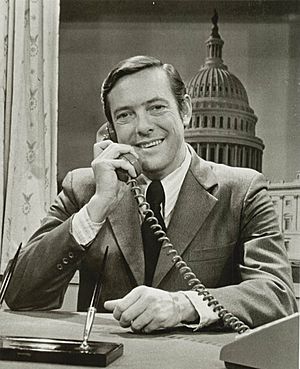Bill Brock facts for kids
Quick facts for kids
Bill Brock
|
|
|---|---|
 |
|
| 18th United States Secretary of Labor | |
| In office April 29, 1985 – October 31, 1987 |
|
| President | Ronald Reagan |
| Preceded by | Raymond J. Donovan |
| Succeeded by | Ann McLaughlin |
| 8th United States Trade Representative | |
| In office January 23, 1981 – April 29, 1985 |
|
| President | Ronald Reagan |
| Preceded by | Reubin Askew |
| Succeeded by | Clayton Yeutter |
| Chair of the Republican National Committee | |
| In office January 14, 1977 – January 20, 1981 |
|
| Preceded by | Mary Louise Smith |
| Succeeded by | Richard Richards |
| United States Senator from Tennessee |
|
| In office January 3, 1971 – January 3, 1977 |
|
| Preceded by | Albert Gore Sr. |
| Succeeded by | Jim Sasser |
| Member of the U.S. House of Representatives from Tennessee's 3rd district |
|
| In office January 3, 1963 – January 3, 1971 |
|
| Preceded by | James B. Frazier Jr. |
| Succeeded by | LaMar Baker |
| Personal details | |
| Born |
William Emerson Brock III
November 23, 1930 Chattanooga, Tennessee, U.S. |
| Died | March 25, 2021 (aged 90) Fort Lauderdale, Florida, U.S. |
| Political party | Republican |
| Spouses |
Laura Handly
(m. 1957; died 1985)Sandra Schubert
(m. 2000) |
| Children | 4 |
| Education | Washington and Lee University (BA) |
| Military service | |
| Allegiance | |
| Branch/service | |
| Years of service | 1953–1956 |
William Emerson Brock III (born November 23, 1930 – died March 25, 2021) was an American politician from the Republican Party. He served in both the United States Congress (meaning both the House of Representatives and the Senate) from 1963 to 1977. Later, he was part of the United States Cabinet from 1981 to 1987. His grandfather, William Emerson Brock Sr., was also a U.S. senator, but he was a Democrat.
Contents
Early Life and Start in Politics
Bill Brock grew up in Chattanooga, Tennessee. His family owned a well-known candy company there. He graduated from McCallie School in 1949 and Washington and Lee University in 1953. After college, he served in the U.S. Navy for three years, until 1956. Then, he started working in his family's candy business.
Even though he was raised in a Democratic family, Brock became a Republican in the 1950s. In 1962, he was elected to the United States House of Representatives for Tennessee's 3rd congressional district. This district, which included Chattanooga, had been controlled by Democrats for 40 years. Brock's victory changed that.
Serving in the House of Representatives
Brock was re-elected to the House of Representatives three more times, serving a total of four terms. During his time in the House, he voted on important laws. For example, he voted in favor of the Civil Rights Act of 1968, which helped protect people's rights. However, he voted against the Civil Rights Act of 1964 and the Voting Rights Act of 1965.
Becoming a U.S. Senator
After serving in the House, Brock decided to run for the United States Senate in 1970. He won the Republican nomination and then faced the current U.S. Senator, Albert Gore Sr., who had been in office for a long time. Brock's campaign focused on Senator Gore's voting record, which was seen as too liberal for many people in the Southern United States. Brock won the election and became a U.S. Senator.
As a new senator, Brock worked on many important issues. He helped create the Congressional Budget Act, which changed how Congress handles the national budget. He also sponsored a law called the Equal Credit Opportunity Act. This law made sure that financial institutions could not treat people differently based on their gender or marital status when they applied for credit, like credit cards. This was a big step for women's access to credit.
Brock also worked with other senators to make the Senate more efficient. He helped create the U.S. Senate Energy Committee and made changes to how committees worked. He was known for working well with both Democrats and Republicans, which helped Congress pass important laws during the 1970s. These laws included the Clean Water Act, the Endangered Species Act, and the Safe Drinking Water Act.
Re-election Challenge
In 1976, Bill Brock ran for re-election to the Senate. His opponent was Jim Sasser, who had managed Albert Gore Sr.'s previous campaign. Sasser used the public's feelings about a major political scandal from a few years earlier to his advantage. He also pointed out that Brock had paid less in income taxes than many ordinary people in Tennessee.
Additionally, the Democratic presidential candidate, Jimmy Carter, was very popular in Tennessee that year. All these factors combined led to Brock losing his re-election bid to Jim Sasser.
Roles After the Senate
After leaving the Senate, Bill Brock became the chairman of the Republican National Committee from 1977 to 1981. This is a very important role in the Republican Party.
When Ronald Reagan became president, he appointed Brock to two important positions in his Cabinet. First, Brock served as the U.S. Trade Representative from 1981 to 1985. In this role, he helped manage trade agreements between the United States and other countries. After that, he became the United States Secretary of Labor until 1987. As Secretary of Labor, he was in charge of issues related to workers and jobs in the country.
In late 1987, Brock left his Cabinet job to manage Senator Bob Dole's campaign for president. After this, Brock worked as a consultant in Washington, D.C. He later ran for the U.S. Senate in Maryland in 1994 but was not elected.
Personal Life
Bill Brock married Laura Handly in 1957. They had four children together. Laura passed away from cancer in 1985. Later, in 2000, he married Sandra Schubert.
Bill Brock died on March 25, 2021, in Fort Lauderdale, Florida, at the age of 90.
See also
 In Spanish: Bill Brock para niños
In Spanish: Bill Brock para niños
 | Frances Mary Albrier |
 | Whitney Young |
 | Muhammad Ali |


